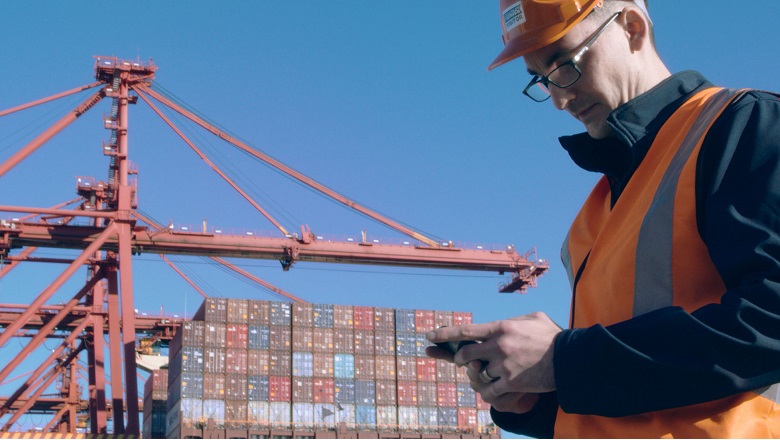Seventeen tonnes of almonds have successfully been shipped and tracked from Sunraysia in Victoria, Australia, to Hamburg in Germany in a blockchain-based collaboration between Commonwealth Bank and five Australian and international supply chain leaders.
Commonwealth Bank demonstrated a new blockchain platform underpinned by distributed ledger technology, smart contracts and the internet of things (IoT) to facilitate the trade experiment, tracking the shipment from packer to end delivery in parallel to existing processes.
Chris Scougall, Managing Director of Industrials and Logistics in Client Coverage, CBA said: “Our blockchain-enabled global trade platform experiment brought to life the idea of a modern global supply chain that is agile, efficient and transparent. We believe that blockchain can help our partners reduce the burden of administration on their businesses and enable them to deliver best-in-class services to their customers.”
As part of the experiment, CBA partnered with global agriculture player Olam Orchards Australia Pty Ltd, Pacific National for rail haulage, port landlord Port of Melbourne, stevedore Patrick Terminals and shipping carrier OOCL Limited. Hardware and software support was provided by Australian IoT provider LX Group to ship the almonds from Mildura to the global hub of Hamburg.
Alex Toone, CBA Managing Director of Global Commodities and Trade, said: “By bringing together partners from across the end to end supply chain and developing a new platform underpinned by emerging technology, blockchain and IoT, we were able to prove a concept to modernise global trade.”
The platform digitises three key areas of global trade – operations, documentation and finance – by housing the container information, completion of tasks and shipping documents, on a purpose-built blockchain.
Partners were able to view and track the location of the shipment as well as view the conditions, such as temperature and humidity inside the container, via four IoT devices. This level of data provided partners in the supply chain with a greater level of transparency and efficiency regarding the location, condition and authentication of the goods being transported.
Emma Roberts Supply Chain Manager, Olam Orchards Australia Pty Ltd, said: “Trade inefficiency can be extremely detrimental to our business. It is vital that as an industry, we look at emerging technology for ways to enhance the supply chain to develop a more transparent and efficient platform. This project has shown that through collaboration from all parts of the supply chain that this can be achieved.”
At the documentation layer, the blockchain-enabled supply chain allows partners to upload and access key documents, such as bill of lading, certificates of origin and other documents required by customs, which streamlined these processes.
Gerhard Ziems, Chief Financial Officer, Pacific National said: “Since the expansion of globalisation, global supply chains have continued to become more complex. This project is unique as it looks to re-imagine how the supply chain communicates and shares information. Simple access to this information provides us with an ability to better utilise our assets and provide customers with better, more efficient services.”
Ashley Dinning, Chief Commercial Officer, Patrick Terminals said: “We are always looking for ways to innovate and drive better results. This project has provided a heightened level of transparency, enabling us to explore further efficiencies for our business, such as improving yard management.”
Melissa Poon, General Manager for Trade and Development at the Port of Melbourne, said: “Emerging blockchain technology creates the potential for multi-beneficial productivity gains to Australia’s supply-chain. Through understanding volume loads and shipments coming down the supply chain, we are able to prepare strategies to meet the trade demands of the future. We are excited to be involved in such a ground-breaking project.”
As a key player in the shipping industry, Orient Overseas Container Line (OOCL) is always looking at ways to improve customer service and innovate. By leveraging cutting-edge technology and expertise from their subsidiary CargoSmart, a global shipping and logistics software solutions provider, and by being involved in this project, they were able to further explore additional data points in the entire shipping journey to improve shipment management planning and operations.
The completion of this experiment reiterates CBA’s commitment to partnering with its customers to deliver market leading innovative solutions to industry challenges.
In 2016, CBA and US-based bank Wells Fargo successfully completed the first global trade transaction via blockchain between two independent banks. This latest project built upon that work, examining how CBA could help its partners optimise working capital and asset utilisation, explore trade finance concepts and potential for in-app payment and invoicing.
“We thrive on the opportunity to work with our customers to help them adapt to changing industry trends, particularly technology. It was key to us that we partner with businesses across the entire supply chain, so we could get a holistic picture of how this technology could impact and improve the efficiency of the transport and logistics industry,” Mr Scougall said.
You can find more information on the project here.
Important information
- CBA is using the Ethereum blockchain in this project. Ethereum currently has the most development activity globally, and offers the functionality we require. However other blockchains are developing rapidly and CBA remains open to other options in the future.
- The CBA platform will be set up on a private blockchain, meaning that only participants who are authorised can access information. The private blockchain is a network of known and trusted parties.
- For the purposes of the experiment and in the interest of collaboration we hope to provide increased visibility across all participants, which will achieve a better understanding of the process flow and shared learnings. In a future commercial environment the access rights may be more restrictive, allowing participants to protect commercially sensitive information and restrict user access to the relevant information only.



